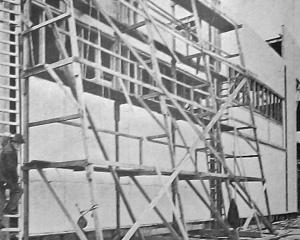What is war good for? That depends entirely on the circumstances. At many points in history, war has been good for the survival of countries, cultures, customs and countless freedoms.
It has been good for protecting children, the infirm, the old and the helpless from rampaging adversaries. It has been good for staving off foreign aggressors from fields, cities, homes and schools nurtured and crafted over generations. It has been good for combating hatred and horror.
It is horrible but, throughout history it has proved time and again to be necessary.
That doesn't mean it should be celebrated. It is the worst of man, smashed together in a cacophony of cruelty, pain, fear and suffering. It should be avoided at almost all costs. It should not be glorified nor advertised as an exciting adventure of adrenaline and derring-do.
But it should not be forgotten, either. Those who have served New Zealand in its armed forces, especially those deployed to battle zones, have played a significant role ensuring the ongoing existence we all benefit from.
Our contribution to the two major wars of last century was significant. Our men and women contributed at great cost to themselves. They worked and fought because their nation needed their service. They suffered - in ways both obvious and subtle - and of course many lost their lives.
Those who have served in our armed forces in other conflicts have ensured our status as a contributing, co-operating and respected member of the international community. Without their service we would be a pariah on the world stage.
But Anzac Day is not, and has never been, a day of chest-thumping glorification. We seem to have managed, as a nation, to have treated the day with solemnity and maturity. We stand in silence and reflect on war as a tragedy.
That matters. It matters to those who have served. It matters that the memory of those who have died is maintained and that their service is not forgotten. And it matters that those who will serve in the future can do so knowing the country is grateful, respectful and aware of their bravery. It allows our future armed forces to rightfully feel the weight of the nation on their shoulders - not as a burden, but as a talisman.
With such a nationwide attitude to Anzac Day then, it is perhaps timely debate over more inclusive celebrations have been raised. In the wake of the Christchurch terror attack, calls for Muslim prayers to be included in services were put forward. Some thought the notion unpalatable.
But Islam has never been the enemy of New Zealand. We have always strived to be an open and tolerant country. We have had Muslim members of our armed forces and we have fought alongside Muslim soldiers from other nations.
We celebrate Anzac Day on the date our own soldiers stormed the beaches of Turkey, attacking and killing Turkish soldiers - many of them Muslim. No Muslim army has stormed our own shores. Nor does Turkey forbid us from remembering our fallen in their own country, year after year.
Germans, Italians, Japanese and others we have fought also deserve our respect and empathy. We can honour our own soldiers while also empathising with the suffering experienced by our then-enemies.
Anzac Day is a day of remembering the suffering, sacrifice and horrible necessity of war. It is not a day of exclusivity, intolerance or rigidity. That is not what this country stands for and is not what it has fought for. It has fought to protect itself and its values.
Anzac Day is perhaps the most important day each year for us to practise those values. We can do so by employing kindness, respect and tolerance in the present, while remembering and honouring the bravery and sacrifice made in the past.












